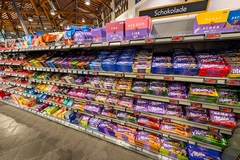
- Industry news
Industry news
- Category news
Category news
- Reports
- Key trends
- Multimedia
- Journal
- Events
- Suppliers
- Home
- Industry news
Industry news
- Category news
Category news
- Reports
- Key trends
- Multimedia
- Events
- Suppliers
FrieslandCampina Secures Worldwide Sustainability Both in Company and Cooperative

Among the targets for 2020 are a 30 per cent reduction in greenhouse gasses, cutting the use of antibiotics to the 1999 level, 100 per cent sustainable use of soy in cattle feed from 2014 and maintaining the current level of outdoor grazing.

23 July 2012 --- In 2011, Royal FrieslandCampina took important steps worldwide to secure sustainability in the 26 countries where the company is active and in the cooperative's approximately 14,400 dairy farms in the Netherlands, Germany and Belgium. The sustainability programme is one of the pillars of the route2020 strategy that is aimed at growth and value creation.
Cees ’t Hart, CEO of Royal FrieslandCampina N.V.: ‘There will be an increased need for nutritionally rich food in the future. Milk and dairy can play an important role here provided, of course, that we focus our efforts on further reducing the environmental consequences of our chain. These include greenhouse gasses, water and energy consumption and the deterioration of biodiversity.’
Support base
The year 2011 centred on the creation of a support base among member dairy farmers who not only contributed to but agreed to the development of the ambitious programme for sustainable dairy farming.
Piet Boer, chairman of Dairy Cooperative FrieslandCampina: ‘Our members, who are also the owners of Royal FrieslandCampina N.V., are independent business people. They have tapped into their professionalism and know-how in efforts to immerse themselves in the themes of climate and energy, animal health, outdoor grazing and biodiversity. We held incisive discussions on these topics in the past year and took important decisions intended to contribute to sustainable dairy farming.’
Outdoor grazing
Among the targets for 2020 are a 30 per cent reduction in greenhouse gasses, cutting the use of antibiotics to the 1999 level, 100 per cent sustainable use of soy in cattle feed from 2014 and maintaining the current level of outdoor grazing. In addition to support through training, FrieslandCampina stimulates outdoor grazing by allocating 45 million euros annually for this purpose. Dairy farmers whose cattle graze for a minimum of six hours a day, 120 days a year receive 0.50 euro per 100 kilos of milk. In the spring of 2012, not only was Campina milk from pasture-fed cows available in shops but also Milner cheese, Vifit and Optimel made using pasture-fed milk.
Procurement of sustainable raw materials
In 2011, the organisation took important follow-up steps in the sustainable procurement of raw materials such as soy (meal) for cattle feed, palm oil, cocoa and FSC-certified packaging materials.
FrieslandCampina received the Product Board CSR Award for its sustainable palm oil purchasing policy and for Appelsientje it received the FSC prize for the use of sustainable packaging material. This was achieved thanks to close cooperation with suppliers and clients in the area of sustainability. ISO 26000 certification was also obtained for corporate social responsibility.
Local initiatives
Steps were taken locally too, including initial efforts to reduce the sugar, salt and fat content of products. Many FrieslandCampina products are available in a light variety. The development of uniform labelling was yet another such step. The new labelling standard will be completed in 2012.
In the Netherlands, FrieslandCampina actively contributes to the JOGG initiative (a campaign aimed at stimulating young people to maintain a healthy weight). A cooperative agreement was also signed with the Netherlands Red Cross aimed at tackling nutritional deficiencies among refugees.
Regrettably, two fatal accidents occurred in the Netherlands last year, prompting safety to form an even higher priority among management and staff members.
Research and publicity
In cooperation with a number of renowned research institutes, a study of nutritional habits was launched in Southeast Asia under the name SEANUTS. The results will be presented in the autumn of 2012. In Thailand, a dairy publicity campaign was also initiated whereby health teams visited 1,700 locations with more than 500,000 visitors. Another 1,600 events are being organised at schools.
The Dairy Development Programme, a support initiative for some 40,000 small dairy farms in Southeast Asia and Nigeria, was further followed up.
Mission and vision
Environmental issues and social topics form part of FrieslandCampina’s operations and are a prerequisite for the future growth of the organisation. As one of the leading global players in dairy, FrieslandCampina strives to demonstrate its involvement in the responsible production of dairy as well as leadership in the area of corporate social responsibility. It does this through active endeavours in the fields of nutritional value and health, efficient and sustainable production chains, development of dairy farming in Southeast Asia and Africa and sustainable dairy farming. Sustainability has become a fixed element of the internal training programme that is held in conjunction with business school IMD in Lausanne and Ashridge University, among others.










